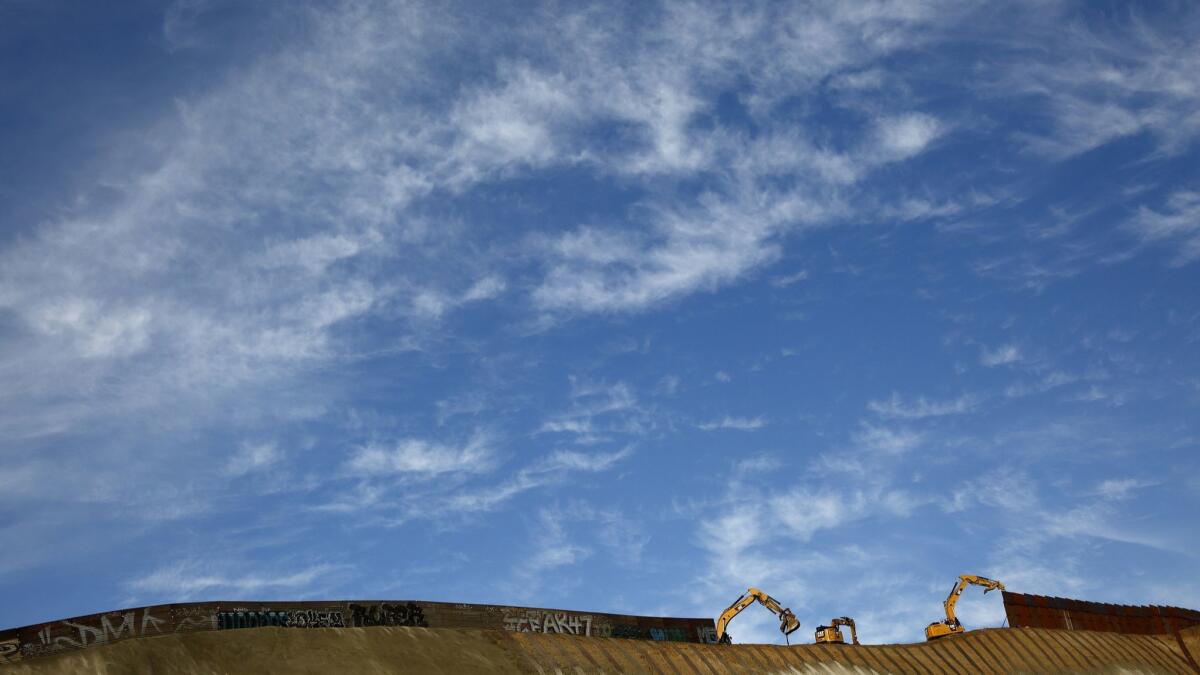Op-Ed: The courts won’t stop Trump’s emergency declaration or his border wall

- Share via
President Trump’s threat to declare a national emergency and build a wall along the U.S.-Mexico border may not be sound policy, but the president’s critics are wrong when they say he cannot constitutionally do it. If Trump makes good on his plans, he would almost certainly win in court.
Speaking for Trump’s Democratic opponents, Rep. Adam B. Schiff (D-Burbank) has called Trump’s idea “a nonstarter” and said point-blank that “this president doesn’t have the power to declare an emergency and build a multibillion-dollar wall on the border.” Some conservatives have objected as well: National Review’s David French judges Trump’s plan “a lawless abuse of power.”
These attacks ignore the very design of the American presidency and the way Congress has amplified it. The Founders wisely didn’t try to limit the government’s power to deal with crises and emergencies. Because the “circumstances that endanger the safety of nations are infinite,” Alexander Hamilton warned in Federalist 23, “no constitutional shackles can wisely be imposed on the power.”
The Supreme Court has never overturned a national emergency declaration, even in cases less dire than the situation at the southern border.
Instead, the Constitution creates a single, independent executive who can immediately respond with “decision, activity, secrecy and dispatch,” in Hamilton’s words. Thomas Jefferson during the Aaron Burr controversy, Andrew Jackson during the nullification crisis, Abraham Lincoln in the Civil War, and FDR during the Great Depression and World War II all called upon these executive powers during emergencies.
And through our history, Congress and the courts have largely cooperated. The 1976 National Emergencies Act, for example, does not define a national emergency or limit the president’s right to declare one. The Supreme Court has never overturned a national emergency declaration, even in cases less dire than the situation at the southern border (Barack Obama declared an emergency out of fear of swine flu; Ronald Reagan declared one when an export control law expired).
Congress has even added to the president’s powers once a national emergency has been declared. Under the International Emergency Economic Powers Act, presidents regularly impose economic sanctions — such as those enacted against North Korea and Iran — after announcing an emergency.
If Trump declares a border emergency, Section 2808 of Title 10 of U.S. law provides authority to build a wall: When a national emergency “requires use of the armed forces,” the Defense Department “may undertake military construction projects . . . not otherwise authorized by law that are necessary to support such use of the armed forces.”
As commander in chief, Trump has already ordered 3,000 troops to defend the nation’s territorial integrity at the southern border. A wall, arguably, would support those troops by protecting them and reducing the need for more troops. Andother, similar laws would allow Trump to redirect funds from civil works projects and drug interdiction programs toward construction of a wall he decided was needed during a national emergency.
The counterargument to all of this relies on the 1952 Supreme Court case Youngstown Sheet & Tube vs. Sawyer.
During the Korean War, President Truman ordered U.S. steel mills to operate despite a nationwide strike because he wanted to keep materiel flowing to the front. The court concluded that seizing the mills was a legislative act that could only be authorized by Congress. The link between the Korean battlefield, where the court acknowledged presidential power was at its height, and the steel mills in Ohio was just too attenuated.
The Youngstown case doesn’t apply closely to the border situation; the facts are different. First, the court didn’t question the president’s right to declare an emergency, just the constitutionality of seizing the mills. And Trump need not rely on any constitutional power to move from the emergency declaration to building the wall because Congress has already delegated military construction power to him.
Enter the Fray: First takes on the news of the minute from L.A. Times Opinion »
Legal arguments, of course, do not settle the matter. Just because Trump could declare an emergency and order and pay for construction of a wall doesn’t mean he should. Migrants at the border may not create a real crisis, and invoking such an “emergency” to solve a political dispute over government funding and shutdowns wastes valuable executive capital that might be needed for an undeniable crisis in the future.
Any power, no matter how reasonable in design, can be abused. But it is Congress, not the courts, that should check the president. Supreme Court justices are unlikely to substitute their judgment on the use of troops and military necessity for that of the commander in chief and our elected representatives. Congress can use its appropriations powers to specifically prevent the president from reallocating military and civil funds to build a border wall. And it can resort to impeachment to counter anything it considers to be abuse of power.
Opponents of Trump’s use of emergency powers should look to where the final responsibility lies — the Senate and the House of Representatives — rather than to legal arguments that will not stop the construction of a border wall.
John Yoo is a law professor at UC Berkeley, a visiting scholar at the American Enterprise Institute and a visiting fellow at the Hoover Institution.
Follow the Opinion section on Twitter @latimesopinionand Facebook
More to Read
A cure for the common opinion
Get thought-provoking perspectives with our weekly newsletter.
You may occasionally receive promotional content from the Los Angeles Times.










